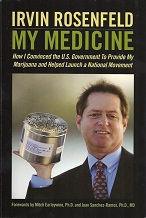Sunshine Johnson has been quietly growing marijuana in the hippie heartlands of northern California for 30 years yet she can’t decide whether to vote for or against legalising recreational sales of the drug.
The Golden State boasts an economy that would be the sixth-largest in the world if it were an independent nation. If, as expected, its residents endorse legalisation at the ballot box on November 8 analysts predict it could be a tipping point in the dismantling of marijuana bans in America and beyond.
“If it doesn’t pass then it could be kind of a bummer,” said Ms Johnson, who runs the Sunboldt Grown co-operative producing legal, organic medical marijuana in Humboldt county, north of San Francisco.
Defeat would kill the momentum of the campaign to legalise marijuana across the US and limit the prospects for existing businesses to expand. But if the law passed Ms Johnson is dreading further incursions into the market by those who “just want to make money and aren’t coming with principles and values”.
That process is already under way, with speculators behaving “like multinational corporations in a third-world country”, she said, buying up land all over Humboldt county, famed for its towering redwood forests, its counter-culture vibe and the quality of its pot.
California was the first state to legalise the cultivation of limited amounts of non-commercial marijuana for medical use, in 1996. Since then half the states in the US have followed suit. Last year the Californian marijuana industry was worth $US2.7 billion ($4bn), half the US legal market. That figure is expected to double by 2020 if recreational marijuana is legalised, dwarfing the isolated markets in the four states that already have fully legal pot, and placing pressure on the federal government to relax the national prohibition on the drug.
Colorado was the first to pass laws legalising and regulating the recreational cannabis business. Alaska, Oregon, Washington and the District of Columbia followed.
Arizona, Nevada, Maine and Massachusetts are also voting on recreational marijuana sales this year.
Mason Tvert, communications director for the Marijuana Policy Project, said there was a real chance the law could be relaxed. Sitting in a cafe in Denver, Colorado, next to a poster for the 1936 propaganda film Reefer Madness — in which teenagers become hooked on marijuana and have their lives ruined — he said the battles ahead were likely to be hard fought.
“We are dealing with Reefer Madness 2.0, geared towards making it seem legal marijuana is scary. The folks that want marijuana to be illegal are doing everything they can to make it sound like it’s fire and brimstone here, when in reality it’s working incredibly well.”
All over California, businesses, investors and even some cash-strapped cities are preparing for the emergence of a regulated, legal large-scale market in medical and recreational marijuana agriculture. For the moment the commercial industry exists in a haze of legal confusion that only began to clear last October when Governor Jerry Brown signed a law that will allow farmers to turn a profit on medical marijuana sales and eliminate limits on the number of plants they can grow. But recreational marijuana sales would be a huge step beyond that.
“We are really, really excited,” said Matthew Feinstein, chief executive of Pineapple Express, a marijuana marketing, consulting and business development company based in Los Angeles. It aims to set up a nationwide chain of marijuana shops and cultivation centres once the industry is fully legal at the federal level. Mr Feinstein, who used to own a national chain of DVD rental shops, assumes that will be in “about two or three years”.
At that point he expects the big pharmaceutical and tobacco companies to charge into the industry, but by then “we will already have made our mark”.
Work is already under way on the first Pineapple Park, a complex of 10 rentable warehouses kitted out for growing marijuana in Desert Hot Springs. The city is one of several pinning their hopes on a marijuana boom to yank them out of economic decline.
references: The Times
http://www.theaustralian.com.au/news/world/the-times/legal-marijuana-california-dreaming-of-joining-us-revolution/news-story/92538bdc3ca43c7e7aef755d03ccd597
Latest
Coronavirus Strikes Massachusetts Cannabis Company Employees
Reassessing the Essential: Cannabis in the Time of a Pandemic
5 Reasons To Try Aspen Valley CBG Flower (30% Off)
High Times Cannabis Cups Go Virtual In Wake Of Coronavirus Pandemic
Drug Enforcement Administration Proposes Plan To Expand Cannabis Research
Ghana Legalizes Cannabis For Medicinal And Industrial Uses
The cheapest legal weed in Canada: Discover these cannabis ‘value brands’
Cannabis and coronavirus: Here’s what you need to know
cannabis designs
The Best Of
WHO Rules CBD Should Not Be a Scheduled Drug

Dr Cristina Sanchez PhD video interview on medical marijuana and cancer

Biochemist Dennis Hill interview; Cannabis oil as a cure for cancer.

The unofficial World Record holder for cannabis smoking part 1





